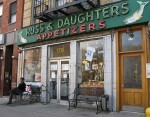Julie Cohen’s The Sturgeon Queens is informative and delightful.
From the fraught origins of the state of Israel to what a possible peaceful future for Israel might look like, this year’s Vancouver Jewish Film Festival, which runs Nov. 6-13 at Fifth Avenue Cinemas, should inspire even the most cynical. Documentary or narrative feature, there seems to be an underlying theme of hope. And who couldn’t use more of that. Here are reviews of a handful of films that the Jewish Independent was able to preview.
***
Dove’s Cry (Israel) follows Hadeel, a 27-year-old Arab Israeli teacher, over the course of a school year as she teaches Arabic and Arab culture to a group of students at a Jewish Israeli primary school near Tel Aviv.
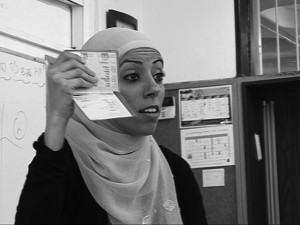
The film begins with a school-wide celebration of Rosh Hashanah. Hadeel is cheerful, energetic and inspired. Her personality is electric and she connects easily with her students. The children vie for her to call on them in class, they are excited to be learning. Her Jewish co-workers seem to respect and admire her.
About a third of the way through the documentary though, a tearful Hadeel tries to process the racist outburst of one of her students, who calls her a “stinking Arab” after a disciplinary incident. Speaking to her family, Hadeel admits that this is the first time she’s experienced such overt racism in five years of teaching. Her shock and disappointment are palpable.
More significant, perhaps, are the casual, daily prejudices that Hadeel experiences, most often from her co-workers, the school’s administration and parents. And, however open the children, they know very little about Arabic, Islam, Christianity or Arab culture, and freely express their apprehension about Arabs, Arab neighborhoods and their fears around terrorism. Hadeel is patient, authoritative, good-humored and kind throughout. During a drill, a teacher asks Hadeel if she has a bomb shelter in her community; Hadeel reminds her that, of course, she does, that she is an Israeli, and faces the same physical threats.
There are stark reminders everywhere that Hadeel is creating a bubble of tolerance in her classroom and, perhaps, at the school, but not beyond that. “In the classroom, I teach one thing and, at home, they teach the opposite,” Hadeel laments. One of the central relationships in the film is with the principal, who reminds Hadeel of the limits of her program and often sides with the parents.
By the time Yom Hashoah, Yom Hazikaron and Yom Ha’atzmaut arrive, Hadeel expresses how torn she is about her position in the school and, by extension, in Israeli society. “Suddenly, I feel like I don’t belong to the place where I was born,” she explains.
Ganit Ilouz’s documentary is a sobering look at the strictures and complexities faced by Israel’s minority citizens. It is a potent reminder at how much better Israelis would be served if all citizens were conversant in Hebrew and Arabic and knew some basic facts about each other’s culture and customs. It’s something Jewish Diaspora communities should consider, as well. Hadeel’s name means “dove’s cry,” a fitting name for a woman tireless and steadfast in her pursuit of a better Israel.
– BL
***
At the centre of Hanna’s Journey (Germany/Israel) is Hanna, a smart, driven woman. We first meet her in a waiting room with several other candidates for a job. As one exits her interview, obviously disappointed, Hanna follows her into the bathroom to find out what type of employee the company is seeking. When she finds out that grades alone won’t be enough, that the company wants someone who’s also dug wells in Africa or is an “eco-freak,” she lets down her hair, removes her lipstick and earrings, and undoes the top button of her blouse. When one of the interviewers notes, “this resumé doesn’t wow me with its diversity,” Hanna lies to them, saying that she only just received her acceptance to go work in Israel with people who have mental disabilities. If she provides them with proof, she has a great chance at getting the job.
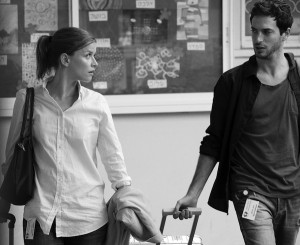
Problem: Hanna’s mother, who runs a social-service nonprofit that sends young Germans to Israel, won’t fake the letter. Solution: Hanna actually goes to Israel, both to work at a village for those with mental disabilities, and also to spend time with a Holocaust survivor.
“In Hanna’s Journey, I’m attending the question [of the] impact the Holocaust has for Israelis and Germans of the third generation, how the shared past is affecting our lives up to today and inseparably connects us,” writes Julia von Heinz in her director’s statement. “The mixture of fascination and disgust which forms the German-Israeli relations, the neurotic, gets symbolized by my film’s complicated love story.”
In the film, Hanna leaves behind her businessman boyfriend Alex. Their relationship seems solid. Certainly no one in the nonprofit’s house where Hanna is billeted will threaten it, as Carsten is gay and Maja is not only unfriendly, but a full-on antisemite. However, Itay, the social worker at the village is another story. The antithesis of Alex, he is not so fond of Germans, at least at first.
During her time in Israel, Hanna discovers much about herself and her family, in particular, her mother, with whom she doesn’t get along. It turns out that the survivor who Hanna visits knew her mother.
Billed as a romantic comedy, Hanna’s Journey is more contemplative than funny and even the romance part is questionable. It’s really a drama, touching on many important topics and allowing various complexities to remain unresolved. The acting is strong, the script is compelling, and it’s a movie that should be taken seriously.
– CR
***
Even if you’ve read Russ & Daughters: Reflections and Recipes from the House that Herring Built by Mark Russ Federman (click here for the review in the JI), Julie Cohen’s The Sturgeon Queens (United States) is informative and delightful. For whatever reason, the story of Russ & Daughters never fails to captivate.
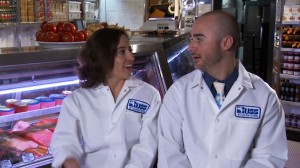
Joel Russ came to New York from Germany in 1907. He joined his older sister and started working right away to contribute to the family income. He married Bella in 1908 and, in 1913, the first of their three daughters – Hattie, Anne and Ida – was born. In 1914, he opened his first store, on Orchard Street. In 1920, he moved it to Houston Street and there it has remained, joined in 2014 by a new family restaurant, Russ & Daughters Café, located on, appropriately enough, Orchard Street.
Cohen’s documentary came out during the store’s centennial year and it features interviews with the two surviving “sturgeon queens,” Hattie Russ Gold, then 100, and her sister Anne Russ Federman, then 92. Mark Russ Federman, who ran the store from the 1970s until 2008, and his daughter Niki Russ Federman and nephew Josh Russ Tupper, who now run the store, are interviewed, and longtime employee Herman Vargas is also featured.
Other interviewees include Ruth Bader Ginsburg, Morley Safer and Maggie Gyllenhaal, as well as chef Mario Batali, as an example of how the customer base has expanded beyond the Jewish community, and writer Calvin Trillin, who’s written stories inspired by Russ & Daughters and wrote the foreword to the book Russ & Daughters. Narration is provided by a table-full of longtime (from one since 1929 to one since 1976) customers, with other historical and family and business information provided by the family interviewees. The use of animation, music, archival photos and film clips all add to the quality of the documentary and the credits are especially cute: they indicate when the film’s major makers’ families each came to America from a wide range of places around the world.
– CR
***
The Jewish Cardinal (France) by Ilan Duran Cohen is based on the true story of Jean-Marie Lustiger, born Aaron Lustiger, a Polish Jew who converted to Catholicism at age 14, during the Holocaust. When we meet him in 1979, he is a vicar in Paris who is being promoted to bishop of the city of Orléans – the location of his conversion and where he was hidden during the war.
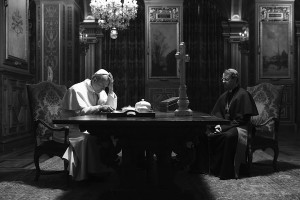
A temperamental and intense man, Lustiger causes a stir when he tells a reporter that he remains a Jew, he is Jewish and Christian, “like Jesus,” he says defiantly. He is “convinced that God has willed” his nomination. “I am a provocation that compels reflection on Christ,” he says, without a hint of irony.
The more we learn about Lustiger, played by a magnificent Laurent Lucas, the better we understand his fervor to reconcile his identities and make peace with his few remaining family members, including his father.
Lustiger has advocates in the Church, but also detractors. Though Pope John Paul II is a robust supporter and promotes Lustiger to archbishop of Paris and then, finally, to cardinal and trusted papal advisor, there remains a tension between the two men. (There are several wonderful scenes of Lustiger’s audiences with the Pope, who is deftly – at times, sinisterly – played by Aurélien Recoing.) Lustiger’s relations with the Jewish community are strained and we see Lustiger harassed by antisemites who accuse him of defiling the Church.
After a group of Polish Carmelite nuns establishes a convent at Auschwitz (not incidentally the site of Lustiger’s mother’s murder), he is asked by the Jewish community and the Pope to negotiate a solution. Many viewers above age 35 will remember the convent and the turmoil it caused for nearly a decade until it was removed in 1993. The film captures the politics and nuances of the incident with terrific results.
Throughout, we sense Lustiger’s confusion over how to balance on the edge of Jewish-Catholic relations, once he loses some of his hubris, that is. On a visit to Auschwitz, he can neither say the Lord’s Prayer nor Kaddish for his mother; when his father passes away, he’s distraught, unable to fulfil his promise to say Kaddish.
Lustiger died in 2007 of lung and bone cancer. Kaddish was recited at his funeral outside the entrance to the Notre Dame Cathedral in Paris.
– BL
***
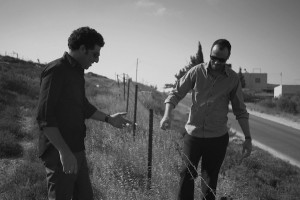
For the dreamers of the world, there is Under the Same Sun (United States/Israel/Palestine), written by Yossi Aviram and directed by Sameh Zoabi. The film starts in a mockumentary style, with all hell breaking loose. The media has discovered that Israeli Shaul Cohen and Palestinian Nizar Ahmad are cooperating in a joint business venture to bring solar energy to West Bank villages, and all the talking heads have their opinions about it.
The film then jumps back a year to a meeting in Marseilles, where Shaul approaches Nizar about the project. From this point to near the end, it’s a regular movie, progressing linearly through time, from the project’s genesis, the difficult search for investors, the effects of the venture on their respective families. Skepticism, anger and obstacles must be overcome. We learn more about each man as each confronts their own prejudices and fears. And all looks lost until Nizar comes up with the idea of using a Facebook campaign to create a groundswell of public opinion that will force political leaders to make peace – and, hence, let their energy project proceed. If only social media were so powerful.
Under the Same Sun is crazily optimistic. With solid acting all round, good pacing (helped by Hilal Zaher’s score) and well-written dialogue, it is a thoroughly enjoyable way to conclude a film festival.
– CR
For showtimes and the full festival schedule, visit vjff.org.

